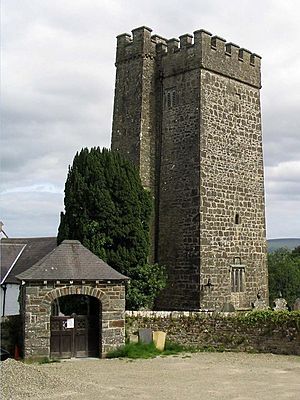St Gwenog's Church facts for kids
Quick facts for kids St Gwenog's Church |
|
|---|---|
 |
|
| Location | Llanwenog, Llanybydder, Ceredigion |
| Country | Wales |
| Denomination | Anglican |
| History | |
| Founded | Medieval |
| Architecture | |
| Heritage designation | Grade I |
| Designated | 6 March 1964 |
| Architectural type | Church |
| Administration | |
| Benefice | Lampeter |
| Archdeaconry | Cardigan |
| Diocese | St Davids |
St Gwenog's Church is a very old church in Wales, located near Llanybydder in Ceredigion. It was built a long time ago, in the late 1300s. You can find it in a small village called Llanwenog. This church is so special that it's a 'Grade I-listed building', meaning it's very important historically.
This church is the only one dedicated to Saint Gwenog. Its oldest parts are from the late 1300s and 1400s. A beautiful tower was added after 1485. Inside, the church has its original barrel-shaped roof from the 1400s. The wooden pews and other furniture are carved with amazing details. Some of this carving was done by Colonel Herbert Davies-Evans in the early 1800s. Other parts were carved by a famous Belgian artist, Joseph Reubens, between 1914 and 1919.
The church was given its Grade I-listed status on March 6, 1964. This was because it is "the most complete medieval church in Cardiganshire, with fine late C15 roof and tower." Experts believe the main part of the church and the chancel (the area around the altar) might be from the 1300s. A small chapel is thought to be from the 1400s.
Today, St Gwenog's Church is part of the Lampeter group of churches. It belongs to the Diocese of St Davids.
Who Was Saint Gwenog?
Not much is known about Saint Gwenog, the person the church is named after. A guide from 2015 suggests that Gwenog might have first been known as Gwenllian or Gwen the Nun. It's thought that she might have started a place for preaching and set up a cross near where the church is now.
Some historians, like Sabine Baring-Gould, describe her as a "Virgin." However, her family history is not clearly recorded anywhere. Nicholas Harris Nicolas lists her special day as January 3rd. Other historians believe she lived in the 600s.
 | Emma Amos |
 | Edward Mitchell Bannister |
 | Larry D. Alexander |
 | Ernie Barnes |

